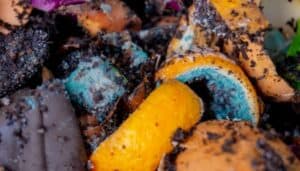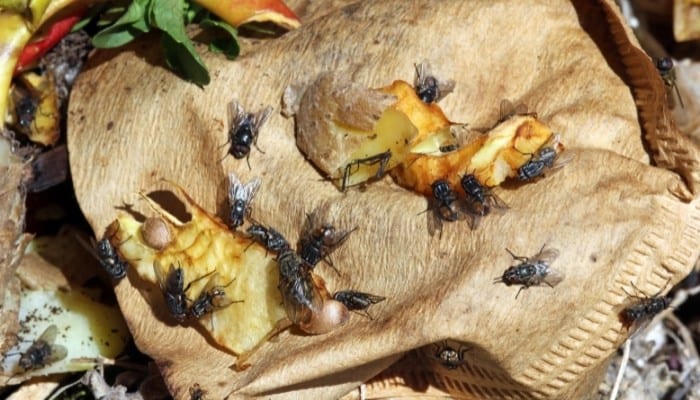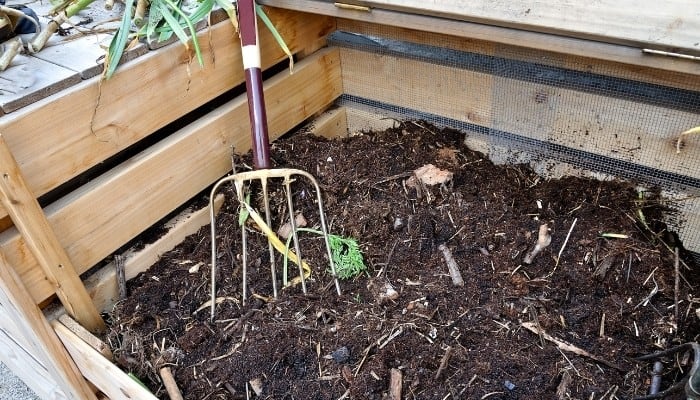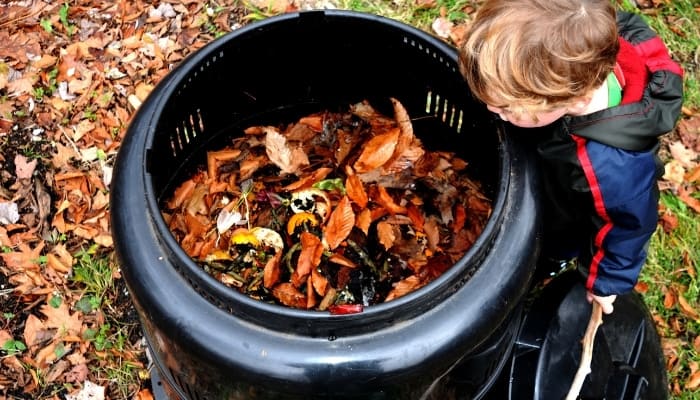All of us should be engaged in the practice of creating compost at home.
Composting avoids the issues associated with food waste and gives you a very useful material to maintain fertility in your garden.
If you are new to composting, it may seem complicated.
But in reality, dealing with and avoiding compost problems could not be easier.
Making the best compost involves understanding what composting is and how it works. To home compost successfully: make sure you add the right materials, maintain the right temperatures, ensure aeration and adequate moisture to ensure a healthy population of microorganisms.
Composting is a natural process.
As leaves and vegetation fall to the soil in a natural ecosystem, they are broken down over time, in the presence of moisture and oxygen, by microorganisms.
When we compost all home, our goal is simply to streamline and harness this natural process and use it to our advantage.
Successful composting simply involves making sure that we do not disrupt this natural process.
Read on for some troubleshooting tips and learn how to create the perfect compost no matter where you live.
Common Compost Problems and Quick Fixes
First of all, let’s take a look at some common compost problems and how to fix them:
Compost Is Too Wet
If your compost is all wet and soggy, this may simply be because you have left your pile or bin uncovered in heavy rain.
If you leave your compost uncovered during a downpour, this can saturate the material excessively.
This can cause it to become compacted, reducing the oxygen in the mix.
Excessive rainfall can also wash nutrients away into the soil below, leaving the finished compost somewhat degraded.
If this is the case, there is a quick fix.
Simply cover your compost with a sheet or board when the weather is very wet – But take care not to let it dry out too much.
If your compost is covered, it may be too wet because you have added too many wet substances.
You may have added too many nitrogen-rich materials (food scraps) and not enough carbon-rich material (yard scraps).
Rebalancing the compost with additional carbon-rich material can help.
Compost Has Maggots
You may have maggots in your compost heap if you have added too many food scraps at once, and the materials have begun to rot.
Flies will have laid their eggs into the food scraps and their maggots will have hatched.
You can reduce the chances of this occurring by always making sure that you cover over food scraps in a composting system with carbon-rich materials.
By having a layer over the surface, you can somewhat prevent flies from laying their eggs.
You can also consider moving to a somewhat different composting system. We’ll look at the options later in this article.
You might wish to consider composting in a closed bin rather than in an open heap.
You might also wish to consider fermenting food scraps before you add them to your main cold composting system.
Mold in Compost
If you see mold in your compost, this may concern you. But not all mold is bad.
Some mold is simply a sign that the composting process is occurring correctly.
Green mold is common in compost which contains a high proportion of food waste.

White mold may be seen on woody particles as they decompose. It is not too worrying if you see either of these types of mold.
Just break up the material and make sure the materials in your compost are well mixed so the composting process can continue.
If you see pink mold, however, this could be due to contamination with cleaning products.
Make sure you avoid getting any soap or other cleaning products in the compost as these can kill the micro-organisms you need for the decomposition.
Most molds are not really harmful and pose no threat as long as you are not composting meat and dairy.
Meat and dairy, however, can harbor pathogens harmful to human health.
So if you wish to compost these, you will need to use a very specific type of hot composting system, or ferment these things prior to composting in a cold composting system.
Compost Smells Bad
If your compost smells bad, this is usually a sign that the mix has become anaerobic.
In other words, something has reduced oxygen in the mix, so the materials are decomposing without the presence of oxygen.
If this occurs, you need to make sure you make your system aerobic once more and re-introduce oxygen into the mix.
A mix may have become anaerobic because the compost has become compacted. If this is the case, aerate the mix by tumbling or turning the material.
The mix can also become anaerobic if you add too much nitrogen-rich material and not enough carbon-rich material.
(For example, if you added a bunch of grass clippings, or too much food waste at once.)
Again, the quick fix is to add more carbon-rich material.
Compost Is Not Breaking Down
Compost may fail to break down, or will break down much more slowly if:
- The temperatures are too low.
- There is not enough moisture in the mix.
- You have not added enough nitrogen-rich materials to the mix.
- Materials are not well mixed and aerated.
- You have added materials that will not break down, or which will break down very slowly.
The first stage in solving this problem is to identify the problem.
If temperatures are too low, consider switching from a cold to a hot composting system.
Add water if the mix is too dry.
Add compost activators that are rich in nitrogen to speed up the process.
You can also speed up the process by using a compost tumbler or turning your compost more regularly.
Make sure you have only added compostable materials to your heap, and have broken up larger woody pieces and other elements which will not break down as quickly.
Flies Around Compost

If there are a lot of flies around your compost, they will usually be there because they have been attracted to food scraps as they break down.
If this is a concern to you, make sure you always cover food scraps with carbon-rich materials.
And consider composting in a closed container or bin.
As mentioned above, you can also consider fermenting food scraps before composting in a bokashi system.
Compost Too Dry
Compost may dry out if it is left uncovered during hot and dry weather.
Consider covering the heap or shading it when the weather is very hot.
Water the heap during periods of drought to make sure you have moisture available to keep micro-organisms doing their job.
Compost can also be too dry if you have added too many carbon-rich materials and not enough nitrogen-rich materials all at once.
Simply add some more nitrogen-rich materials to redress the balance.
Lack of Aeration in Compost
As mentioned above, lack of aeration in compost can cause it to become anaerobic, and smell bad.
Aerate the mix by turning the compost over regularly with a garden fork or another implement. Or invest in or make a compost tumbler.
Avoiding this compost problem also means making sure you add the right balance of materials to your composting system.
Try to make sure you always add layers of carbon-rich and nitrogen-rich materials, and never add too much of either one at the same time.
You can also consider vermicomposting – enlisting the help of special worms to break down and aerate the composting materials.
Compost Not Heating Up
The optimal temperatures for decomposition will depend on which composting method you have chosen.
Higher temperatures will be required in hot composting than are required in a cold composting system.
Sometimes, adding more nitrogen-rich material will be sufficient to jump-start the process and heat up your heap.
Sometimes (especially in hot composting systems), you may need to insulate the heap with plenty of carbon-rich material or add extra insulation to your composting bin.
Insects and Bugs in Compost
It is important to remember that a compost heap is a living system. Like the soil below our feet, it should teem with life.
Most insects and bugs in a compost system are a good thing. They are part of the natural processes which break down the materials and release their nutrients.
However, there may be times when one species proliferates to the degree that they become a problem.
When this is the case, it may be due to an imbalance in the system.
Look to oxygenation, moisture, and the nitrogen and carbon mix to make sure everything continues to go smoothly.
Compost Is Attracting Rodents
Rodents will often be attracted to food scraps in a composting system.
If you encounter this problem, it is usually best to switch to a system that uses a closed bin or other composting container or to use a bokashi compost system to ferment food scraps before you add them to your pile.
Avoid attracting rodents by fermenting all food scraps, especially meat, dairy, and baked goods, before you add them to your composting system.
Compost Too Dense
If your compost is too dense, again, we are usually back to the problem of a lack of oxygen in the mix.
Aerate the mix by ensuring a good balance of carbon and nitrogen-rich materials, and turn or tumble to compost to re-introduce oxygen and create a more open and friable texture to your compost.
Slimy Compost
Slimy compost is usually a sign that you have added too much nitrogen-rich material at once.
This can often occur when too many grass clippings are added to the system.
Make sure you mix in your grass clippings with plenty of carbon-rich material.
Clumpy Compost
Compost may become clumpy if it is too wet, or too dry. It can also become clumpy if your carbon and nitrogen-rich materials are not well mixed.
Use a garden fork or another implement to break up clumps, and look at the basics to make sure the system remains in balance and the materials continue to break down.
Compost may also be clumpy simply because some of the materials in the compost take longer to break down.
You may wish to sieve the compost before you use it to fill containers or use it as a soil amendment in your garden.
How to Maintain a Healthy Compost Pile

Now that we have looked at some of the common compost problems and how to deal with and avoid them, let’s go through the basics to help you make sure you understand how to create the perfect compost every time.
Choose the Right Composting Method
First things first, it is important to make sure you choose the right composting method. There are several different composting systems to consider. You can:
- Compost in place, sheet mulching with organic materials or simply placing materials in a hole or trench to break down in situ on/in the soil.
- Cold composting in a pile or a bin or other container.
- Hot composting (taking steps to increase temperatures in a heap or bin so a greater range of materials can be composted and the process takes place more quickly).
- Vermicomposting (with worms).
- Using a compost tumbler to maintain aeration and somewhat speed up the process.
- Fermenting materials in a bokashi compost system before composting. (Which, again, increases the speed of the process and the range of materials that can be composted.)
Learn What Can and Cannot Be Composted With the System You Have Chosen
Whichever system you choose, it is important to understand what you can and cannot compost in the system you have chosen.
Make sure you do your research and only add compostable and safe materials to your composting system.
Balance Brown and Green Materials
Make sure, whichever system you choose, that you add the right mix of carbon-rich ‘brown’ and nitrogen-rich ‘green materials.
Carbon-rich materials include things like straw, untreated cardboard and paper, and dry leaves.
Nitrogen-rich materials include fruit and vegetable scraps, green leafy materials, and manures.
The ratio of brown to green materials that is optimal will depend on the composting system you have chosen.
Keep the Compost Aerated
As mentioned above, in-home composting, you are usually aiming for aerobic decomposition.
Micro-organisms involved in this type of composting need oxygen to survive.
Make Sure the Compost is Not Too Wet or Too Dry
Moisture level is also key to ensuring a healthy microbial population in your composting system.
Think about these simple things and you are far less likely to encounter any problems.
How Long Does It Take For Compost To Turn To Soil?
How long it will take the materials in compost to break down completely can vary considerably.
It will depend on the composting system you have chosen, the conditions within that system, and the materials in the mix.
How To Know When Compost is Finished
Compost is ready to use in pots or in your garden when the material is brown, friable, and has a pleasant earthy smell.
There should be few if any recognizable signs of the original materials.
Remember, composting is not rocket science. Take care to ensure a good balance, with the right temperatures, oxygen, the right balance of materials and a healthy microbial population and nature should take care of the rest.

